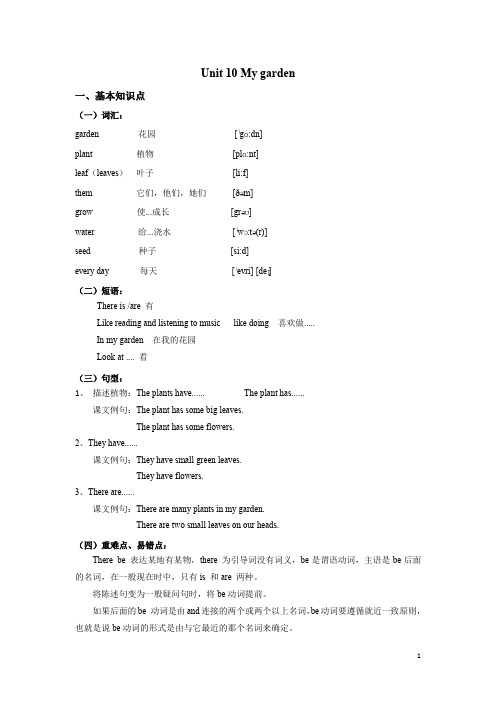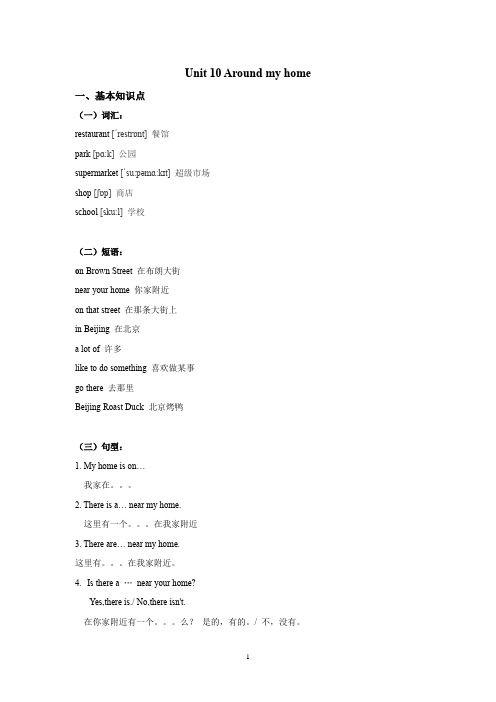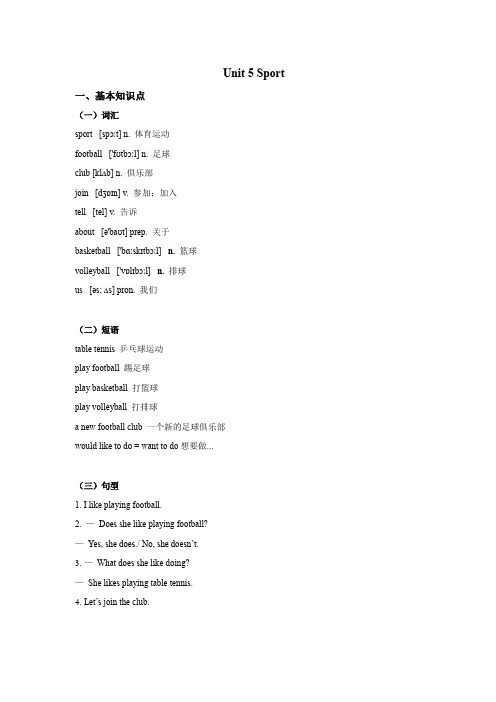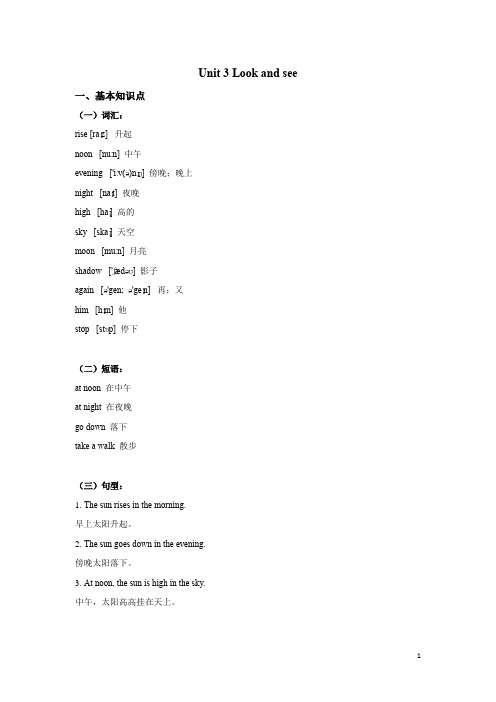沪教版小学四年级英语范文上课讲义
沪教版四年级下册英语Unit10 My garden 讲义

Unit 10 My garden一、基本知识点(一)词汇:garden 花园[ˈgɑ:dn]plant 植物[plɑ:nt]leaf(leaves)叶子[li:f]them 它们,他们,她们[ðəm]grow 使...成长[grəʊ]water 给...浇水[ˈwɔ:tə(r)]seed 种子[si:d]every day 每天[ˈevri] [deɪ](二)短语:There is /are 有Like reading and listening to music like doing 喜欢做.....In my garden 在我的花园Look at .... 看(三)句型:1、描述植物:The plants have...... The plant has......课文例句:The plant has some big leaves.The plant has some flowers.2、They have......课文例句:They have small green leaves.They have flowers.3、There are......课文例句:There are many plants in my garden.There are two small leaves on our heads.(四)重难点、易错点:There be 表达某地有某物,there 为引导词没有词义,be是谓语动词,主语是be后面的名词,在一般现在时中,只有is 和are 两种。
将陈述句变为一般疑问句时,将be动词提前。
如果后面的be 动词是由and连接的两个或两个以上名词,be动词要遵循就近一致原则,也就是说be动词的形式是由与它最近的那个名词来确定。
二、典型例题例题: 1. What ________(do/does) your father ________(has/have)?He ___________(has/have) a basketball.解析: your father 为第三人称单数,所以第一空需要填 does,又因为does为助动词,所以之后的动词需要用原形,同理,答句中主语是He,也是第三人称单数,have需要改为第三人称单数形式has。
沪教版四年级上册英语Unit10 Around my home讲义

Unit 10 Around my home 一、基本知识点(一)词汇:restaurant [ˈrestrɒnt] 餐馆park [pɑ:k] 公园supermarket [ˈsu:pəmɑ:kɪt] 超级市场shop [ʃɒp] 商店school [sku:l] 学校(二)短语:o n Brown Street 在布朗大街near your home 你家附近on that street 在那条大街上in Beijing 在北京a lot of 许多like to do something 喜欢做某事go there 去那里Beijing Roast Duck 北京烤鸭(三)句型:1. My home is on…我家在。
2. There is a… near my home.这里有一个。
在我家附近3. There are… near my home.这里有。
在我家附近。
4.--Is there a …near your home?--Yes,there is./ No,there isn't.在你家附近有一个。
么?是的,有的。
/ 不,没有。
5. --Are there any ... near your home?--Yes,there are. No,there aren't.在你家附近有一些。
么?是的,有的。
/ 不,没有。
(四)重难点、易错点:1. There be句型的肯定句。
一般疑问句及回答。
2. 方位介词behind near on in3. Where 引导的特殊疑问及回答二、典型例题知识点一:词汇的考察1. 在街上_______【解析】答案:on the street2. 许多_________【解析】答案:a lot of3. 在我家后面_________【解析】答案:behind my home4. 一些餐馆_________【解析】答案:some restaurants5. eat nice food_________【解析】答案:吃一些好的食物知识点二:词法的应用1. There ______ a shop near my home.A.isB. areC. am 【解析】答案:A 后面的shop是单数,所以前面用there is.2. It’s a busy street ______ Beijing.A.onB. atC. in 【解析】答案:C Beijing 表示城市,所以前面用介词in。
沪教版四年级下册英语Unit5 Sport讲义

Unit 5 Sport 一、基本知识点(一)词汇sport [spɔːt] n. 体育运动football ['fʊtbɔːl] n. 足球club [klʌb] n. 俱乐部join [dʒɒɪn] v. 参加;加入tell [tel] v. 告诉about [ə'baʊt] prep. 关于basketball ['bɑːskɪtbɔːl]n. 篮球volleyball ['vɒlɪbɔːl]n. 排球us [əs; ʌs] pron. 我们(二)短语table tennis 乒乓球运动play football 踢足球play basketball 打篮球play volleyball 打排球a new football club 一个新的足球俱乐部would like to do = want to do想要做...(三)句型1. I like playing football.2. —Does she like playing football?—Yes, she does./ No, she doesn’t.3.—What does she like doing?—She likes playing table tennis.4.Let’s join the club.(四)重难点、易错点1. play + 球类运动表示“打...; 踢... ”, 注意积累球类运动的词汇2. 学习动词的用法:like to do/ doing sth 喜欢做某事want to do sth 想要做某事let sb do sth 让某人做某事tell sb about sth 告诉某人关于某事3.含有实义动词的肯定句变一般疑问句和特殊疑问句二、典型例题1. ________ Alice like playing football?A.DoB. DoesC. Is2.I like ________ basketball.A.playsB. playC. playing3.Let’s ________ the music club.A.joiningB. joinsC. join4. — Does he like playing the volleyball club?— Yes, ________.A.he likeB. he likesC. he does三、变式习题基础题(一)词汇运动football打篮球关于tellus打排球(二)对话匹配( ) 1. Does Peter like playing table tennis? A. She likes walking.( ) 2. Would you like to come with me? B. Yes, he does.( ) 3. What lessons do we have today? C. Sure.( ) 4. What does she like doing ? D. We have Art, English and Maths. ( ) 5. What subjects do you like? E. I like Maths.提高题(一)单项选择( ) 1. Alice is my friend. I like volleyball. She ________ volleyball, too.A. likeB. likesC. liking( ) 2. They like _______ football in the playground.A. playsB. playC. playing( ) 3. My favorite subject is Art. What ________ you, Kitty!A.forB. toC. about( ) 4. San and I want ________ the club.A. to joinB. joinC.joining( ) 5. —What’s your favorite subject?—My favorite subject is PE because I can ________ in PE class.A. draw a pictureB. play the violinC. play table tennis(二)连词成句1.that’s, idea, a, good (!)_______________________________________________________________2.she, playing, does, like, football(?)_______________________________________________________________3.join, let’s, club, the (.)_______________________________________________________________4.you, want, go, do, with, to, us (?)_______________________________________________________________强化题(一)用所给词的适当形式填空。
最新整理沪教版四年级上册英语教案范文

沪教版四年级上册英语教案三篇范文一《Hello again》教学内容:Look and say & Ask and answer教学目标:1.Basic aims:a. Using verbs to describe actions. e.g. paint, readb. Using interrogatives to ask ‘yes/no’-questions to obtain simple responses. e.g. Can you swim?c. Using modals to talk about ability. e.g. Yes, I can. / No, I can’t.2 .Developing aims:a. Asking about ability.b. Do a survey in class.cation aims:Talking about ability to establish friendly relations with your classmates.教学准备:pictures, word cards, cassette player,教学过程:一、Warming-up1. Song2. Responding to simple instructions e.g. Sing a song. Draw a circle. Pre-task二、preparation1. Revision Invite individual students to come2.Presentation to the board and choose a Picture Card and mime whether they can do or can’t do a particular action.The rest of the class say: He/She can/can’t…Invite individual students to stand up.Point to the pictures and ask: Can you …?And prompt them to use: Yes, I can. /No, I can’t. to answer your questions.三、While-task procedure(1)Introduce: paint1. Introduce: paint by miming a painting action, and then stick the Word and Picture Cards on the board.2. Read the word with action.3. Ask individual students: Can you paint? to elicit: Yes, I can./No, I can’t,4. Ask and answer in pairs.(2)Introduce: read1. Draw a picture on the board. Ask: What can she do? to elicit: She can read.2. Read the word in different voices.3. Ask individual students: Can you read? What can you read? to elicit: I can read English/a story.(3)Listen and say1. Play the cassette: Look and say. Students listen.2. Play the cassette again. The students follow in their books and, in groups of four, practice the dialogue.3. Invite individuals to read the dialogue to the class.四、Post-task activities(1)Production1. Show a photo album. Tell students that it is your album. Encourage them to ask about your photograph using ‘Can you …?’2. Students work in pairs using the pictures in Ask and answer to find out what their partner can and cannot do.3. Do a survey: Ask students to walk around the class and interview three to five classmates. Students are to find their classmates who can or cannot do a certain thing. Invite individual students to report back to the class.(2)Assignment1. Complete Workbook page two.2. Write about your ability using ‘I can…’范文二《More insects and plants》教学内容:Look and read Play a game教学目标:1. 知识目标:Using possessive adjectives to show possession Using nouns phrases to identify people,animals,events,objects and activities Asking simple questions to obtain yes/no answers2. 能力目标:Communicate with teachers or other learners3. 情态目标:爱护绿化重点难点:Its stalk is long. Has it got …?Teaching aids:pictures,recorder教学过程:一、Warming –up1,Sing a song2,Daily talkRevision Review:stalk,leaves,flowers,roots,二、Presentation1.Show a picture of a plant with flowers. Ask:What is it?Is it a tree? To elicit:a plant/ Ask:What colour are the flowers? What colour are the leaves? To elicit:They?re…Ask:Are they long or short? To elicit:They?re long(short) .2.Draw another plants. Say:Look at this plant.Its flowers are red. Look at that plant .Its flowers are purple.3.Listen to the tape.4.Say sth.about the plant .Show a picture of a tree. Introduce:a trunk,branches.Make sentences:Its trunk is big. It branches are long.Listeen to the tape.Say sth about the tree.Play the cassette:Play a game/ Listen and repeat.Play this game.三、Consolidation1.Photocopiable pages 44-45.2.Workbook page 29.3.Grammar practice book 4a page 35.板书设计:Unit 2 Look at,,, Its stalk is…Its trunk is…leaves are …branches…roots flowers范文三《On the farm》教学目标:1.能听懂、会说、会读交际用语:Welcome to …What are these/those?They’re …Are these/those …?Yes, they are./No, they aren’t2.能听懂、会说、会读词汇:they’re=they are, pig, cow, chicken, duck3.能听懂、会说、会读、会写词汇:farm, they, pig, apple, those4.能熟练朗读对话或表演对话。
沪教版四年级下册英语Unit3 Look and see讲义

Unit 3 Look and see 一、基本知识点(一)词汇:rise [raɪz]升起noon [nuːn] 中午evening ['iːv(ə)nɪŋ] 傍晚;晚上night [naɪt] 夜晚high [haɪ] 高的sky [skaɪ] 天空moon [muːn] 月亮shadow ['ʃædəʊ] 影子again [ə'gen; ə'geɪn]再;又him [hɪm] 他stop [stɒp] 停下(二)短语:at noon 在中午at night 在夜晚go down 落下take a walk 散步(三)句型:1.The sun rises in the morning.早上太阳升起。
2.The sun goes down in the evening.傍晚太阳落下。
3.At noon, the sun is high in the sky.中午,太阳高高挂在天上。
4.He sees a black shape behind him.他看到身后一个黑影。
5.The black shape runs too.那个黑影也跑起来。
6.Henry the dog takes a walk in the morning.早上小狗亨利去散步。
(四)重难点、易错点:1. 学习介词in搭配时间的用法:in the +morning/afternoon/evening (在早晨/中午/晚上)2. 学习介词at搭配时间的用法:at+noon/night (在中午/晚上)3. 知道字母组合ph和wh在单词中的发音:/f/: photo Philip/w/: what whale white二、典型例题1. He is in front of ________; I am behind ________.A.I; himB. me; himC. I; he【解析】答案:B. 考查人称代词宾格,in front of 为介词短语,后加宾格;behind 也是介词,需要加宾格。
沪教版四年级下册英语Unit4 Subjects讲义

Unit 4 Subjects 一、基本知识点(一)词汇:Subject [ˈsʌbdʒɪkt] 学科;科目Lesson [ˈlesn] 课Chinese [ˌtʃaɪˈni:z] 语文Maths [mæθs]数学English [ˈɪŋglɪʃ] 英语Science [ˈsaɪəns] 科学PE [ˌpi:'i:] 体育Music [ˈmju:zɪk] 音乐Art [ɑ:t] 美术timetable [ˈtaɪmteɪbl] 课程表;时间表from [frəm] 从;来自a.m. [ˌeɪˈem]上午p.m. [ˌpiːˈem]下午break [breɪk] 休息from…to…从…到…(二)短语:from…to…从…到…(三)句型:1. What lessons do we have today?我们今天上什么课?2.We have..我们有......3.What subjects do you like?你喜欢什么学科?(四)重难点、易错点:1. What+名词的提问eg: What subjects…2. We have+课程我们上…课。
二、典型例题1. This is my timetable ________today.A. atB. forC. to【解析】答案:B 根据句意:“这是今天的课表”。
使用介词for。
可知答案为B。
2. Tom likes Music. He likes________.A. singingB. singC. painting【解析】答案:A 根据句意:“Tom喜欢音乐”。
Like+doing 可知答案为A。
3. ________9a.m.________ 9: 40 a. m. we have Chinese.A. From/toB. For/toC. From/too【解析】答案:A from…to为固定搭配。
可知答案为A 。
4. We have a lunch________ at noon.A. breakB. breadC. breakfast【解析】答案:A 根据句意:“午餐休息”。
沪教版四年级下册英语Unit11 Children's Day讲义

Unit 11 Children’s Day 一、基本知识点(一)词汇:song [sɔ:ŋ] 歌曲zoo [zu] 动物园cinema [ˈsɪnəmə] 电影院museum [mjuˈziəm] 博物馆also [ˈɔ:lsoʊ] 也;还(二)短语:have a party举办聚会go to the cinema 去看电影ride a bike 骑自行车go to the zoo去动物园play football 踢足球fly kites 放风筝Children's Day 儿童节in the morning 在早上in the afternoon 在下午in the evening 在晚上at night 在晚上at noon在中午in+国家在......国家in+月份在几月on+节日(Children's Day)在儿童节(三)句型:1、Let's sing a song.我们唱歌吧。
2、I go to the zoo with my parents.我跟我父母一起去动物园。
3、I can ride a bike with my brother.我可以跟我哥哥一起骑自行车。
(四)重难点、易错点:1、also “也” 用于句中too “也” 用于句末2、play football 踢足球play chess 下象棋play the piano弹钢琴3、Do you +动词原形- Do you go to the park on Children's Day?- Yes, I do.- No, I don't.4、on Children's Day 在儿童节二、典型例题1. I go to school _______ Wednesday.A.onB. inC. at【解析】答案:A 固定搭配on Wednesday, 在星期几用介词on。
2. You can fly a kite with _______.A.IB. myC. me【解析】答案:C with后跟人称代词的宾格形式。
沪教版四年级上册英语Unit8 At the shop讲义

Unit 8 At the shop一、基本知识点(一)词汇:shop [ʃɒp] 商店tomato [tə'mɑːtəʊ] 番茄;西红柿(复数tomatoes)soup [suːp]汤potato [pə'teɪtəʊ] 土豆(复数potatoes)carrot ['kærət] 胡萝卜thirty ['θɜːtɪ] 三十fish [fɪʃ] 鱼meat [miːt]肉rice [raɪs] 大米glasses ['glɑːsɪz]眼镜want [wɒnt] 想要together [tə'geðə] 一起magic ['mædʒɪk] 神奇的;有魔力的(二)短语:make soup 做汤would like…想要… (想要做… would like to do… = want to do…)a pair of…一副/双… (如:一副眼镜a pair of glasses)come to 来到want to do…想要做…play together 一起玩look at…看…a glasses shop 一个眼镜店have an idea 有一个主意in some Asian countries 在亚洲的一些国家(三)句型:1. What would you like? 你想要什么呢?I’d like some tomatoes. 我想要一些西红柿。
2. How much…? …多少钱呢?回答:用“数字+钱”直接回答。
(如:How much is your bag? -Thirty yuan.)3. Here you are. 给你。
4. Can I help you? 我能帮你吗?(四)重难点、易错点:1. some 的用法:用于肯定句中,表示一些;当疑问句表示请求,希望得到肯定回答时,也可用some。
[讲解] 1. I have some good friends. 我有一些好朋友。
- 1、下载文档前请自行甄别文档内容的完整性,平台不提供额外的编辑、内容补充、找答案等附加服务。
- 2、"仅部分预览"的文档,不可在线预览部分如存在完整性等问题,可反馈申请退款(可完整预览的文档不适用该条件!)。
- 3、如文档侵犯您的权益,请联系客服反馈,我们会尽快为您处理(人工客服工作时间:9:00-18:30)。
My favourite food
There is a lot of food in the world. My favourite food is rice. It is small and white. It is soft. It tastes yummy. It smells nice. I like to eat it at noon. It makes me full. I like rice best. Do you like it?
My favourite fruit
There is a lot of fruit in the world. My favourite fruit is grapes. They are purple and round. They are smooth. They taste sweet and sour. They smell nice. I like to eat them in summer. Do you like them?
My favourite animal
I have a dog. Its name is Henry. It is my favourite animal. It has a small nose and two big eyes. Its legs are long. It can run fast and jump high. It is clever. I like it very much.
My favourite sport
My favourite sport is basketball. I always wear a T-shirt to play basketball. I can throw the basketball in the net. I can catch the basketball too. I like to watch basketball games on TV. I want to be a basketball player.
My favourite season
There are four seasons in a year. My favourite season is summer. In summer, it's hot and wet. The flowers are beautiful. The leaves are green. I can go to the beach and swim in the sea. I can eat ice cream too.
My favourite festival
My favourite festival is the Spring Festival. My parents buy me new clothes before the festival. On New Year’s Eve, we have a big dinner together. I can visit my relatives and friends. I can watch colourful fireworks too. I like the Spring Festival. My family I have a small family. There are three people in my family. They are my father, my mother and I. My father is a worker. My mother is a worker too. I am a student. We are happy. I like my family.
My day
I go to school at seven o’clock every weekday. I usually have seven classes at school. I often go home at half past four in the afternoon. After dinner, I do my
homework in the living room. Then, I have a bath and go to bed.
My week
I go to school on weekdays. I often go to the school library on Monday and Tuesday afternoon. On Wednesday and Thursday afternoon, I usually go to the Chinese chess club. I go home early on Friday afternoon. At weekends, I go to the park. I always have a good time there.
My shadow
This is my shadow. It is also my friend. I go to school at seven o’clock in the morning. My shadow often goes with me. Sometimes my shadow stays behind me. Sometimes my shadow walks in front of me. Sometimes my shadow grows short and small. Sometimes my shadow grows big and strong. I like my shadow.。
